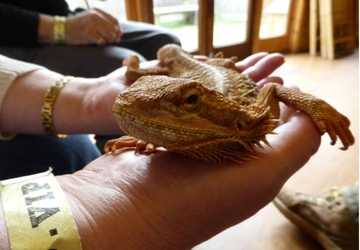Special care is imperative for exotic pets due to their distinct and often labyrinthine needs, which deviate from conventional pets like felines and canines. Exotic pets, encompassing reptiles, amphibians, avians, and small mammals, originate from diverse ecosystems and demand environments that emulate their indigenous habitats.
Habitat Requirements

One of the quintessential aspects of special care for exotic pets is the provision of an appropriate habitat. Each species exhibits unique requisites for temperature, humidity, and spatial parameters. For instance:
- Reptiles frequently necessitate enclosures with precise thermal gradients and ultraviolet irradiation to regulate their body temperature and bolster metabolic functions.
- Birds require capacious aviaries equipped with perches and toys to cultivate their mental and physical well-being.
- Amphibians mandate humid environments to maintain dermal hydration and avert health complications.
Constructing a suitable habitat is paramount among exotic pet care tips and ensures that the pet remains healthy and devoid of stress.
Dietary Needs
The dietary regimen of exotic pets can be quite intricate. Unlike felines and canines, which have relatively rudimentary dietary needs, exotic pets often necessitate specific diets that closely resemble their natural forage. Some exotic pet care tips for diet include:
- Providing reptiles with a diet comprising live insects, vegetables, and fruits meticulously tailored to the species.
- Supplying birds with a mélange of seeds, fruits, and specially formulated pellets to ensure a balanced diet.
- Ensuring small mammals like ferrets and hedgehogs receive high-protein diets that cater to their carnivorous inclinations.
Comprehending and fulfilling these dietary needs is crucial for caring for unusual pets and forestalling nutritional deficiencies.
Health and Veterinary Care
Regular Check-ups
Routine veterinary examinations are a linchpin of special care for exotic pets. Exotic animals frequently obfuscate signs of sickness, making it indispensable for owners to schedule regular visits to an exotic pet veterinarian. These professionals are adept at discerning subtle health issues that may elude untrained observation.
Specialized Veterinary Services
Exotic pets require veterinarians who possess specialized acumen in exotic animal care. General practice vets might lack the expertise to manage these animals' unique health concerns. Therefore, one of the most pivotal exotic pet care tips is to procure a specialized vet who can deliver the requisite medical attention.
Common Health Issues
Different exotic pets are predisposed to various health issues. Some common disorders include:
- Reptiles may suffer from metabolic bone disease due to calcium deficiencies or suboptimal lighting.
- Birds are susceptible to respiratory infections and feather plucking, often attributable to stress or poor nutrition.
- Small mammals can develop dental problems if their diet lacks sufficient roughage to naturally rub their teeth.
Being aware of these potential health issues is vital for caring for unusual pets and ensuring they receive prompt treatment.
Social and Behavioral Needs
Social Interaction
Many exotic pets have particular social needs. For instance:
- Birds are highly social and necessitate regular interaction with their owners or conspecifics to sustain mental health.
- Reptiles and amphibians may prefer solitude but require environmental enrichment to preclude boredom and stress.
- Small mammals often relish socializing with other animals or humans, and a shortage of interaction can precipitate behavioral aberrations.
Addressing these social needs is critical to special care for exotic pets.
Behavioral Enrichment
Providing mental and physical stimulation is indispensable for taking care of unusual pets. Some efficacious exotic pet care tips for enrichment include:
- Introducing toys and puzzles that challenge the pet's cognitive abilities.
- Creating a variegated environment with diverse textures and objects to explore.
- Offering opportunities for exercise, such as climbing structures for reptiles or exercise wheels for small mammals.
Enrichment activities help mitigate ennui, diminish stress, and promote overall well-being.
Legal and Ethical Considerations

Legal Requirements
Owning exotic pets entails various legal responsibilities. Many jurisdictions have regulations concerning the ownership of certain species. It is imperative to research and comply with local laws to ensure that caring for unusual pets is done responsibly and legally.
Ethical Ownership
Ethical considerations are also paramount when deciding to own an exotic pet. Prospective owners should contemplate:
- The potential impact on wild populations if the pet trade involves capturing animals from their natural habitats.
- Long-term commitment is required, as some exotic pets can have longevity spanning several decades.
- The ability to consistently meet the animal's intricate needs.
Being an ethical owner is integral to special care for exotic pets and ensures that the animals are treated with the respect and care they deserve.
Specialized Care for Exotic Pets: Beyond the Basics
Environmental Enrichment and Stimulation
Sensory Stimulation
Special care for exotic pets necessitates sensory enrichment to emulate their indigenous biomes. Some efficacious methods encompass:
- Utilizing variegated substrates such as arenaceous, gravelly, and loamy textures to replicate the tactile sensations of the wild.
- Incorporating arboreal and lithic elements to create a multifaceted habitat.
- Employing auditory enrichment, such as playing biophonic sounds or recordings of conspecifics to mimic their natural auditory environment.
These enrichment strategies are paramount among exotic pet care tips for enhancing the quality of life for exotic fauna.
Climatic Adaptation
Adapting the microclimate within the pet's enclosure to reflect seasonal oscillations is critical for caring for unusual pets. This involves:
- Modulating the temperature and hygrometry to simulate seasonal fluxes.
- Adjusting the photoperiod to reflect the circadian rhythms of the animal's native habitat.
- Introducing seasonal forage and foraging opportunities to emulate natural cycles and encourage instinctual behaviors.
Advanced Nutritional Management
Tailored Diet Plans
Formulating individualized alimentation schemas is essential for special care for exotic pets. This includes:
- Consulting with a veterinarian to craft species-specific nutrition plans considering the animal's senescence, health status, and activity levels.
- Incorporating many alimentary sources to prevent dietary monotony and ensure comprehensive nutrition.
- Utilizing dietary supplements judiciously to address specific nutritional deficiencies or health concerns.
Foraging and Hunting Simulations
To cater to the instincts of exotic pets, exotic pet care tips recommend simulating foraging and hunting behaviors:
- Concealing nourishment in various loci within the enclosure to encourage natural foraging.
- Employing puzzle feeders and interactive toys that necessitate the pet to solve challenges to access sustenance.
- Introducing live prey in a controlled manner for species that naturally hunt, ensuring the practice is safe and humane.
Conclusion
Taking care of unusual pets necessitates a profound understanding of their unique needs. By adhering to the essential exotic pet care tips delineated above, owners can furnish exemplary care for their exotic companions. Every facet of special care for exotic pets is pivotal for their health and contentment, from constructing suitable habitats and fulfilling dietary requisites to ensuring proper veterinary care and enrichment. Being mindful of legal and ethical considerations further underscores the responsibility of owning these captivating creatures.
